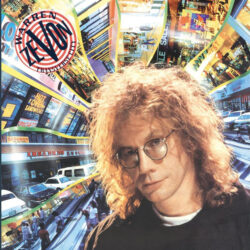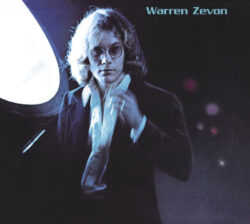
I suppose part of the worth of this feature is, having selected an artist, you choose a favourite album, and then, pick another and damn it with faint praise. Here at AUK we’re not really in the business of “dissing” an artist but it has to be accepted that all of our heroes have in their canon some albums which are better than some of the others. It’s a bit like asking a mother or father who their favourite kid is and which one they’d happily foster out.
Anyhow, having pondered on this for some while I decided to alight on the late Warren Zevon, at least I won’t offend him. There are 12 studio albums and two official live releases to consider here and an easy way out is to say that his first release, 1970’s “Wanted Dead Or Alive”, released under the moniker of Zevon, is that disc I can live without. However, it’s so much of an outlier that many folk are not even aware of its existence and, while fanatics might consider it to have its moments, we can easily excise it here as it’s not billed as a Warren Zevon album (my get out of jail free card). It’s very much of its time and is a somewhat confused and poorly recorded disc, Kim Fowley was involved initially but the pair fell out. Any strength in the songs is buried under its dated production. So, kicking that to one side, I perused the “official” set of Warren Zevon albums and came up with this, my favourite and least favourite kid (in reverse order).
Can’t Live With It: “Transverse City” (1989)
 After the triumphs of his 1976 “Warren Zevon” “debut” and its follow-up, “Excitable Boy”, Zevon’s personal demons caught up with him. “Bad Luck Streak In Dancing School” was considered lacklustre and after “The Envoy” failed to chart in 1982, Zevon was dropped from his label, Asylum Records. There was then a five-year gap before “Sentimental Hygiene” appeared. Recorded with members of REM (and with guest slots from Dylan and Neil Young) the songs were taut, sardonic and snappy, it was a strong comeback. Two years later came “Transverse City”, billed by some as a concept album and stuffed with another bunch of stellar guests including Jerry Garcia, Neil Young, Dave Gilmour (Pink Floyd) and jazz virtuoso Chick Corea. The album grew from Zevon’s interest in the cyberpunk literature of writers such as Phillip K Dick and William Gibson. As such it’s an apocalyptic album, dystopian in its viewpoint, the computers taking over as evidenced on ‘Networking’, while he imagines us policed by ‘The Long Arm Of The Law’, a song which finds Zevon still wandering around the mercenary territories of ‘Roland The Headless Thompson Gunner’ but here given a real sense of dread. At the heart of the album is a classic Zevon song in the shape of ‘Splendid Isolation’, it shines out amidst much of the confusion which surrounds it.
After the triumphs of his 1976 “Warren Zevon” “debut” and its follow-up, “Excitable Boy”, Zevon’s personal demons caught up with him. “Bad Luck Streak In Dancing School” was considered lacklustre and after “The Envoy” failed to chart in 1982, Zevon was dropped from his label, Asylum Records. There was then a five-year gap before “Sentimental Hygiene” appeared. Recorded with members of REM (and with guest slots from Dylan and Neil Young) the songs were taut, sardonic and snappy, it was a strong comeback. Two years later came “Transverse City”, billed by some as a concept album and stuffed with another bunch of stellar guests including Jerry Garcia, Neil Young, Dave Gilmour (Pink Floyd) and jazz virtuoso Chick Corea. The album grew from Zevon’s interest in the cyberpunk literature of writers such as Phillip K Dick and William Gibson. As such it’s an apocalyptic album, dystopian in its viewpoint, the computers taking over as evidenced on ‘Networking’, while he imagines us policed by ‘The Long Arm Of The Law’, a song which finds Zevon still wandering around the mercenary territories of ‘Roland The Headless Thompson Gunner’ but here given a real sense of dread. At the heart of the album is a classic Zevon song in the shape of ‘Splendid Isolation’, it shines out amidst much of the confusion which surrounds it.
For all its merits, “Transverse City” struggles these days, partly due to the then-prevalent use of synths and 80s production techniques (a struggle it shares with its two predecessors). It opens with an almost oriental tapestry of synthetic sounds on the title song before Zevon comes in somewhat heavy-handed as he descends into a world akin to that portrayed in “Bladerunner”. Jerry Garcia’s guitar solo, almost buried in the production, sounds too hurried. ‘Run Straight Down’, with Dave Gilmore’s guitar wailing away is claustrophobic and cluttered with Zevon singing over a robotic voice which seems to be repeating a chemical formula. ‘Gridlock’, a song about, you guessed it, being stuck in a traffic jam, is just too riff heavy and ‘Turbulence’, while being much more listenable is a clumsy attempt to marry the dash of his earlier songs to the then current state of war in Afghanistan. Overall the 1980s weren’t Zevon’s best years and in 1989 ‘Transverse City’ was his nadir. Having said that and having listened to the album for the first time in aeons it does perform better than my memory of it, although I’m happy enough to place it back on the shelf to gather some more dust.
Can’t Live Without It: “Warren Zevon” (1976)
 For me, this is a no-brainer. AUK has featured this in our Classic Albums feature while, when I was tasked with listing my top 10 essential Warren Zevon songs, the top four were plucked from this masterpiece. Released on Asylum Records with the likes of Jackson Browne, Linda Ronstadt and various Eagles in tow, it was less interested in the then very popular glamorous face of L.A. rock, preferring to peek into its dark underbelly. The opening ‘Frank And Jesse James’ was much grittier than the Eagles’ take on western myth on “Desperado” while ‘Mama Couldn’t Be Persuaded’, ostensibly a country rock song, is the first appearance of a common Zevon character, a character shady and definitely not to be trusted. When Zevon does slip into singer/songwriter mode he does so with style. ‘Backs Turned, Looking Down The Path’ is quite sublime (with Jackson Browne playing the slide guitar) while ‘Hasten Down The Wind’ positively aches. But the album really gets out of the gate when ‘Poor Poor Pitiful Me’ gallops into view. This is Zevon in his prime, primal rock’n’roll with a Gonzo touch, yelps and all. He was to revisit this abandon on his hugely entertaining follow-up, “Excitable Boy”, but this is the blueprint along with a latter song on the album, ‘I’ll Sleep When I’m Dead’. What really lifts this album into classic status is a triumvirate of songs. ‘Carmelita’, possibly Zevon’s most beautiful song, ‘The French Inhaler’, a song which inhabits the murky history of L.A. in a manner akin to Kenneth Anger’s “Hollywood Babylon” and the closing song, the titanic ‘Desperadoes Under The Eaves’. Rather than try to update my take on this song, I wrote this about it in my earlier article… “While the Eagles played at being desperadoes in a made-up wild west world, Zevon’s desperado is stuck in limbo in a soulless Los Angeles. There’s a delicious irony as he sits in a Hawaiian-styled Tiki bar with a mindset worthy of nihilists such as Thomas Bernhard. He imagines his only way out of his dilemma, basically not being able to pay his rent, is for California to slide into the sea in a cataclysm. Tourist images are transformed into a personal Calvary with the palm trees looking like crucified thieves. The song is given an epic delivery with sweeping strings as Zevon and the cream of LA (Carl Wilson, JD Souther and Jackson Browne ) hymn the hum of an air conditioner as he looks wistfully on to a receding Gower Avenue, the spiritual (and actual) home of the original Hollywood film studios.”
For me, this is a no-brainer. AUK has featured this in our Classic Albums feature while, when I was tasked with listing my top 10 essential Warren Zevon songs, the top four were plucked from this masterpiece. Released on Asylum Records with the likes of Jackson Browne, Linda Ronstadt and various Eagles in tow, it was less interested in the then very popular glamorous face of L.A. rock, preferring to peek into its dark underbelly. The opening ‘Frank And Jesse James’ was much grittier than the Eagles’ take on western myth on “Desperado” while ‘Mama Couldn’t Be Persuaded’, ostensibly a country rock song, is the first appearance of a common Zevon character, a character shady and definitely not to be trusted. When Zevon does slip into singer/songwriter mode he does so with style. ‘Backs Turned, Looking Down The Path’ is quite sublime (with Jackson Browne playing the slide guitar) while ‘Hasten Down The Wind’ positively aches. But the album really gets out of the gate when ‘Poor Poor Pitiful Me’ gallops into view. This is Zevon in his prime, primal rock’n’roll with a Gonzo touch, yelps and all. He was to revisit this abandon on his hugely entertaining follow-up, “Excitable Boy”, but this is the blueprint along with a latter song on the album, ‘I’ll Sleep When I’m Dead’. What really lifts this album into classic status is a triumvirate of songs. ‘Carmelita’, possibly Zevon’s most beautiful song, ‘The French Inhaler’, a song which inhabits the murky history of L.A. in a manner akin to Kenneth Anger’s “Hollywood Babylon” and the closing song, the titanic ‘Desperadoes Under The Eaves’. Rather than try to update my take on this song, I wrote this about it in my earlier article… “While the Eagles played at being desperadoes in a made-up wild west world, Zevon’s desperado is stuck in limbo in a soulless Los Angeles. There’s a delicious irony as he sits in a Hawaiian-styled Tiki bar with a mindset worthy of nihilists such as Thomas Bernhard. He imagines his only way out of his dilemma, basically not being able to pay his rent, is for California to slide into the sea in a cataclysm. Tourist images are transformed into a personal Calvary with the palm trees looking like crucified thieves. The song is given an epic delivery with sweeping strings as Zevon and the cream of LA (Carl Wilson, JD Souther and Jackson Browne ) hymn the hum of an air conditioner as he looks wistfully on to a receding Gower Avenue, the spiritual (and actual) home of the original Hollywood film studios.”



Agree pretty much, but Splendid Isolation is glorious.
Hi Paul,
It’s so weird that you should say that on listening to Transverse City recently you didn’t think it was as bad as you remembered,I had exactly the same experience ,I reckon it’s because there are other albums from the same era that have aged really badly. There are shocking Jackson Browne albums from the same time.
Agreed JB has released some dross in the last few years. We can forgive those as he has supplied several damn fine albums and his career high Late For The Sky.
Honestly, don’t you wish Desperados Under the Eaves would go on for another minute or two? Agree on Transverse. I will say, Mr. Bad Example is pretty underrated.
Thank you, Paul.
Can’t Live Without It: “Warren Zevon”(1976), “Sentimental Hygiene” (album), ”My Ride’s Here”(album; especially the song “Genius”, a career highpoint), “The Envoy” (album), “Life’ll Kill Ya” (album). Bonus picks (ala John Cusack in “High Fidelity”, the movie: “Excitable Boy” (the album; “Monley Wash, Donkey Rinse” (song from album “Mutineer”); “Mutineer” (title song from that album); and, “Networking” (from “Transverse City” — also that title song).
Can’t Live With It: Vapid, Uninformed, Internet, music criticism.
Well, I can accept internet and music criticism (as that’s what it is) but vapid?, uninformed? Please expand if you can